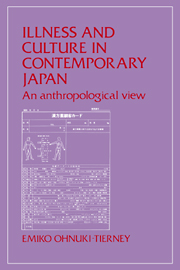Book contents
- Frontmatter
- Contents
- List of illustrations
- Acknowledgments
- 1 Introduction
- Part I Basic concepts and attitudes toward health and illness
- 2 Japanese germs
- 3 My very own illness: Illness in a dualistic world view
- 4 Physiomorphism (somatization): An aspect of the Japanese illness etiology
- Part II Medical pluralism
- Summary
- References
- Index
4 - Physiomorphism (somatization): An aspect of the Japanese illness etiology
Published online by Cambridge University Press: 12 January 2010
- Frontmatter
- Contents
- List of illustrations
- Acknowledgments
- 1 Introduction
- Part I Basic concepts and attitudes toward health and illness
- 2 Japanese germs
- 3 My very own illness: Illness in a dualistic world view
- 4 Physiomorphism (somatization): An aspect of the Japanese illness etiology
- Part II Medical pluralism
- Summary
- References
- Index
Summary
The description of the hara (stomach) and the dualistic world view of the Japanese might have given the impression that the Japanese concept of illness is close to holism, as it is perceived in “holistic medicine” in the United States. However, the Japanese concept of illness and holistic medicine in the United States are very different in their concepts of the causes of illness. My own observations of doctor-patient interactions, as well as the published literature, point out that both doctors and patients in Japan pay a great deal of attention to psychobehavioral abnormalities. Patients complain of emotional states such as depression and irritation (iraira suru) and personality traits such as a tendency toward introversion, as well as excessive sweating or shortness of breath. Emphasis on these symptoms is especially strong in kanpō, the Chinese-derived medicine described in Chapter 5. However, these traits receive attention only as symptoms; causal explanations are almost never sought in the psychodynamics of the patient.
When the Japanese postulate that ki (mind, spirit) is responsible for illness, they really do not mean psychogenesis. When they say yamai wa ki kara (illness from one's mind), they refer to physical illnesses resulting from worries and other psychological propensities that have negative effects on the body. When they use the label ki no yamai, they refer to a mild negative psychological state, such as a mild case of hypochondria. In both expressions, ki (mind or spirit) refers to a psychological state in the simple sense of the word.
- Type
- Chapter
- Information
- Illness and Culture in Contemporary JapanAn Anthropological View, pp. 75 - 88Publisher: Cambridge University PressPrint publication year: 1984



